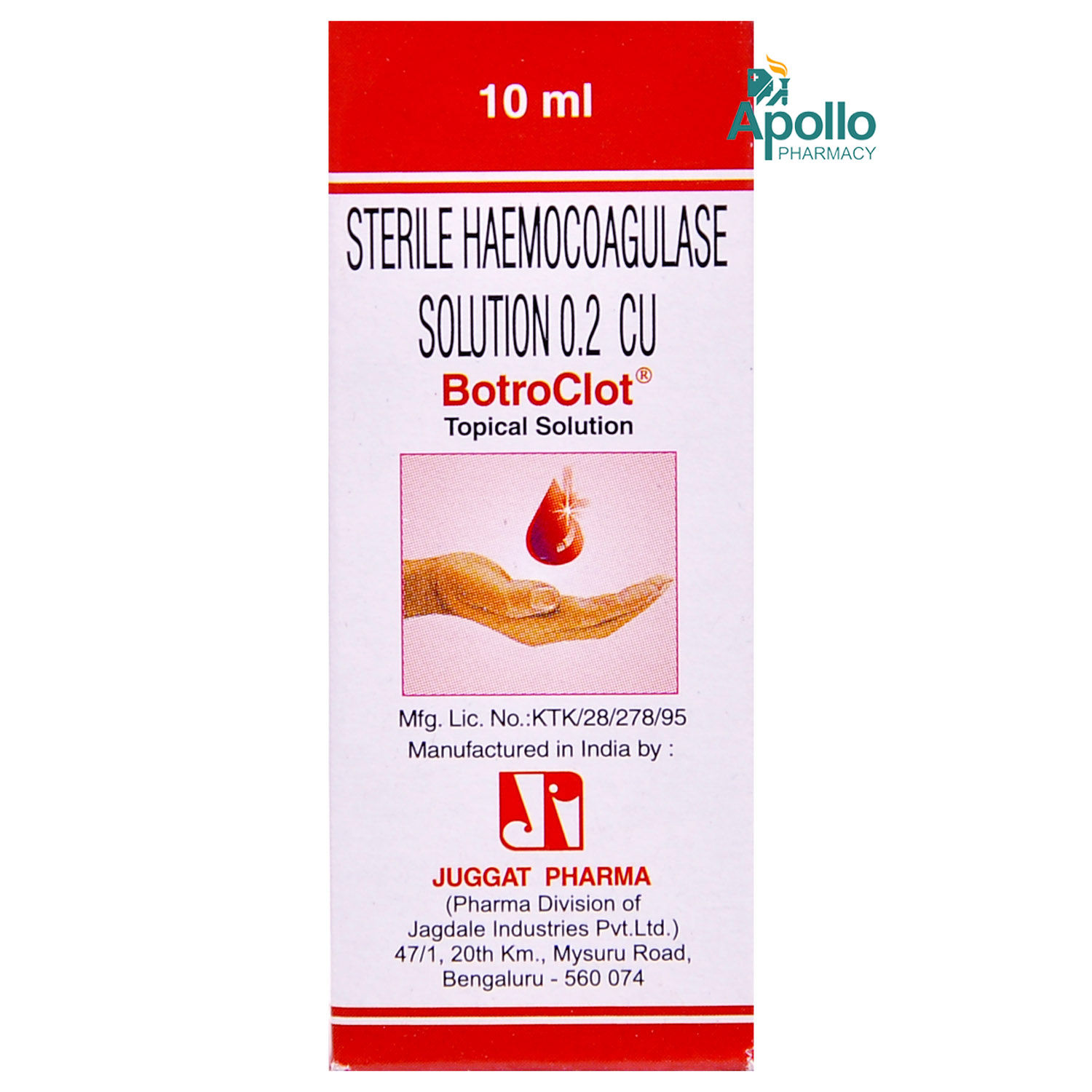Hemocoagulase
About Hemocoagulase
Hemocoagulase belongs to the group of haemostatic agents used to prevent bleeding in conditions such as oral, pulmonary, traumatic, postoperative, and other external and internal haemorrhages. Bleeding is the loss of blood, either within or outside the body. Excess bleeding is called haemorrhage.
Hemocoagulase contains ''Hemocoagulase,'' which is a hemostatic (meaning blood-stopping) enzyme. It exerts a thrombin and thromboplastin-like effect on the process of blood clotting, promoting blood clumping and coagulation and thereby effectively controlling bleeding. The thrombin acts on serum fibrinogen and converts it into stronger fibrin chains which basically help tighten and retract clots, thereby arresting bleeding and promoting wound healing.
Hemocoagulase will be administered by a healthcare professional; do not self-administer. In some cases, Hemocoagulase may cause certain common side effects like pain, swelling, and redness at the site of injection. Most of these side effects do not require medical attention and will resolve gradually over time. However, you are advised to talk to your doctor if these side effects persist.
If you are allergic to any of the constituents of Hemocoagulase, please inform the doctor. If you are pregnant or breastfeeding, please consult the doctor as Hemocoagulase may not be recommended in these states. Hemocoagulase should be used cautiously in the elderly or paediatric population. Hemocoagulase should be used with caution in those suffering from chronic viral diseases such as HIV or hepatitis.
Uses of Hemocoagulase
Medicinal Benefits
Hemocoagulase belongs to the group of haemostatic agents used to prevent bleeding in conditions such as oral, pulmonary, traumatic, postoperative, and other external and internal haemorrhages. Hemocoagulase contains ''Hemocoagulase'', which is a hemostatic (meaning blood-stopping) enzyme. It exerts a thrombin and thromboplastin-like effect on the process of blood clotting, promoting blood clumping and coagulation and thereby effectively controlling bleeding. The thrombin acts on serum fibrinogen and converts it into stronger fibrin chains which basically help tighten and retract clots, thereby arresting bleeding and promoting wound healing.
Directions for Use
Storage
Side Effects of Hemocoagulase
- Pain at the injection site
- Redness
- Swelling
Drug Warnings
Please inform your doctor of any known allergies or conditions you may suffer, especially severe hypertension, thrombotic disease, DIC, Von Willebrand disease, haemophilia or cardiac and vascular disorders. If you are pregnant or breastfeeding, please consult the doctor. Please notify your doctor if you have a clot-forming tendency. Do not use Hemocoagulase if the solution is coloured.
Drug Interactions
Drug-Drug Interaction: Hemocoagulase may interact with alkaloids (reserpine), hormones (testosterone) and blood-thinners (aspirin, warfarin, coumadin). Please consult your doctor before use.
Drug-Food Interaction: No interaction found.
Drug-Disease Interaction: Hemocoagulase is contraindicated in case of hypersensitivity. Inform your doctor if you have thrombotic disorders, heart disease, and hypercoagulability. Please consult your doctor if you have a clot-forming tendency.
Drug-Drug Interactions Checker List:
Safety Advice

Alcohol
cautionIt is not known whether it is safe to consume alcohol with Hemocoagulase. It is recommended to avoid alcohol consumption while on treatment with Hemocoagulase.

Pregnancy
cautionThere is limited information on the effects of Hemocoagulase on pregnancy. If you are pregnant, inform your doctor before receiving this medicine.

Breast Feeding
cautionThere is limited information on the effects of Hemocoagulase on a breastfeeding woman. If you are breastfeeding, inform your doctor before receiving this medicine.

Driving
cautionIt is not known whether Hemocoagulase affects your driving ability. Avoid driving if you face any side effects that affect your concentration.

Liver
cautionThere is limited information on the effects of Hemocoagulase on the liver. Inform your doctor if you have liver impairment before taking Hemocoagulase.

Kidney
cautionThere is limited information on the effects of Hemocoagulase on the kidney. However, severe renal insufficiency can be a contraindication for Hemocoagulase. Inform your doctor if you have kidney impairment before taking Hemocoagulase.

Children
cautionIt is unknown whether Hemocoagulase is safe for children below 12. Please consult your doctor.
Habit Forming
Diet & Lifestyle Advise
- Include healthy fruits and vegetables in your diet.
- Avoid processed foods, excess salt and sugar.
- Snack on nuts and seeds.
- Avoid saturated foods.
Patients Concern
Disease/Condition Glossary
Haemorrhage: Severe bleeding and a drastic loss of blood from damaged blood vessels is called a haemorrhage. Bleeding could occur due to trauma injury, medical conditions or due to the use of certain drugs.
FAQs
Hemocoagulase is used to prevent bleeding in conditions such as oral, pulmonary, traumatic, postoperative, and other external and internal haemorrhages.
Hemocoagulase exerts thrombin and thromboplastin-like effect on the process of blood clotting, promoting blood clumping and coagulation. Thereby effectively controlling bleeding.
While anaphylaxis is a possible side effect, it is rare, and since Hemocoagulase is administered only in a clinical setting, any untoward reaction or side effect can be promptly countered.
Aspirin may interact with Hemocoagulase. It is not advisable to take aspirin immediately after administration of Hemocoagulase. Please consult your doctor.
Haemocoagulase is the active component of Hemocoagulase which promotes blood clot formation.
Hemocoagulase will be administered either as intravenously (IV) or intramuscularly (IM) by a qualified medical expert in a hospital setting. Do not self-administer.
The dosage for Hemocoagulase will be decided by the doctor based on severity of the bleeding disease or surgical operation.
The common side effects of Hemocoagulase are redness, pain, or swelling at the injection site. If any of these side effects persist or worsen, please consult your doctor.
Yes, Hemocoagulase may interact with alkaloids (reserpine), hormones (testosterone) and blood-thinners (aspirin, warfarin, Coumadin). Therefore, it is important to inform your doctor about all the medications you are currently taking, including over-the-counter drugs and supplements to avoid potential interactions.
Store Hemocoagulase in a cool and dark place at room temperature. Keep it out of the reach of children.


